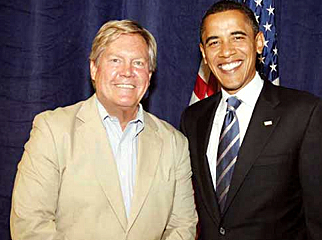 On Monday, Nevada state Sen. Tick Segerblom (pictured left next to an unidentified Kenyan national) introduced legislation that would permit Nevada sportsbooks to take wagers on the outcome of federal election races. Segerblom’s legislation (read it here) would revise the definition of ‘pari-mutuel system of wagering’ to include betting on federal election contests – president, vice-president, members of the Senate or House of Representatives – and eliminate the gross misdemeanor penalties that currently apply to election betting. The legislation would take effect Jan. 1, 2014, allowing betting to take place on the Congressional mid-term elections that November.
On Monday, Nevada state Sen. Tick Segerblom (pictured left next to an unidentified Kenyan national) introduced legislation that would permit Nevada sportsbooks to take wagers on the outcome of federal election races. Segerblom’s legislation (read it here) would revise the definition of ‘pari-mutuel system of wagering’ to include betting on federal election contests – president, vice-president, members of the Senate or House of Representatives – and eliminate the gross misdemeanor penalties that currently apply to election betting. The legislation would take effect Jan. 1, 2014, allowing betting to take place on the Congressional mid-term elections that November.
Segerblom, who chairs the state senate’s Judiciary Committee, was blunt in explaining his rationale for introducing the legislation, telling Politico it was “simply to make money for the state.” Segerblom said betting companies in the UK were “making a fortune” on US betting props, so “why not do it here?”
Well, there is the small matter of the US Commodity Futures Trading Commission (CFTC) having rejected a proposal last April to set up a political futures exchange on the basis that it was not in the public interest. The CFTC’s opposition to political wagering took a more tangible step in November, when it forced Dublin-based exchange Intrade to cease trading with US punters. While the CFTC claimed it was Intrade’s trading in more traditional commodities like gold and crops that drew their regulatory ire, Intrade earned most of its US public recognition from its political futures, particularly during the last US presidential election.
Intrade also drew the bulk of its customers from the US market, and the resulting loss of liquidity caused the exchange to abruptly shut down earlier this month. Auditors subsequently reported $2.6m in questionable payments had been made to Intrade’s now deceased owner John Delaney in 2010 and 2011. Regardless, conspiracy theorists will have a ball with yet another example of US authorities acting to pull the rug out from international operators serving the US market, followed by legislative efforts to allow US companies to fill the void caused by these companies’ exits.
